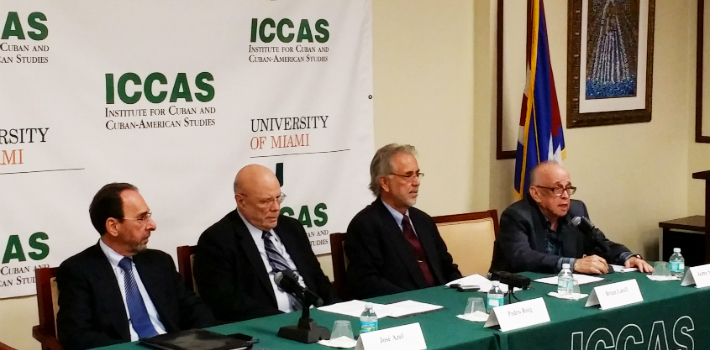EspañolAs protesting Venezuelans seek to oust the Chavista regime, they have more to overcome than just their fellow countrymen. Among the foreign groups colluding with the regime, including Iranians and the FARC from Colombia, Cuba is the closest and most important ally.
Given the heightened crisis over the past few weeks, this close relationship compelled the Institute for Cuban and Cuban-American Studies at the University of Miami to gather a panel on Tuesday evening. Before an audience of 40 attendees, they put forward a variety of possible scenarios and then weighed the implications for Cuba and options for the United States (video here).

Although the panelists — including institute scholars and Susan Kaufman Purcell of the Center for Hemispheric Policy — covered a lot of ground in their two hours, they all agreed that the Cuban regime is extremely dependent on Venezuela and will do all it can to maintain that relationship. Estimates for various aid flows from Venezuela to Cuba went as high as US$13 billion annually, which equates to more than $1,100 per individual on the island and far in excess of the average salary of $240-360.
“This has nothing to do with ideology,” Pedro Roig explained; “it has all to do with corruption” — in reference to both the Cuban parasitism and that of other foreigners embedded in the government, in particular the military. Roig estimates that Cuba has between 7,000 and 8,000 full-time military personnel in Venezuela right now, a boost of approximately 2,000 in just the past few days. If one includes Cubans working in other professions, but still with military training, his number jumps to 30,000.
The Cuban regime has been through these challenges before, Brian Latell recounted, and will be well aware of how to handle the situation — even if the size of this uprising has caught them by surprise. At one time, Chile, Grenada, and Nicaragua all had leaders who were solid allies of Cuba and then fell from power, and Venezuela is “vastly more important.” The panelists speculated that Cuba may even resort to recruiting troops from allies such as Ecuador and Bolivia.
While Raul Castro is supporting President Nicolás Maduro for now, Latell continued, he could easily drop the former bus driver if he cannot get the job done and stay in power. In particular, Latell says, Maduro’s Cuban advisers will warn against any open referendums or elections, given the likelihood of a loss.
Should the opposition take the reins in Venezuela and stop aid to Cuba, José Azel believes the economic impact would be “horrendous” on the island — such is the dismal state of the domestic economy. However, Azel does not believe such a challenge would be fatal; he asserted it would be smaller than the end of the Soviet support, which the regime managed to overcome.
Azel’s chief concern, though, is the lack of coverage in mainstream outlets. If the opposition were to fail, he said, it would give the impression that “nobody really cares.”
The question of what the United States should do about all this fell to Kaufman Purcell, but she said there was little likelihood of any military action. The US “people are tired of wars,” and even she did not feel any knee-jerk inclination for a confrontation.
In the diplomatic realm, though, she expressed grave frustration with a lack of condemnation — almost across the board in Latin America. She also thought negotiation was a lost cause and that Capriles’s inclination to do so on the domestic front was an error.
Kaufman Purcel did suggest a variety of measures that could turn up the heat on those in power, such as freezing some people’s bank accounts in the United States and blocking travel visas. In particular, she said an end to petroleum purchases would hit them where it hurts, given revelations that they are already very low on reserves.
Charles Salas, an attorney in the audience, said the panelists were all “excellent and to the point”; he just wished “that more people would have attended.… but that was also mentioned, in terms of the importance, the coverage that the US media gives to these issues, Latin-American issues. It’s a real shame that the media doesn’t make an effort to keep the American public informed…”
Listen to his comments here (1 minute, MP3).
 Versión Español
Versión Español












